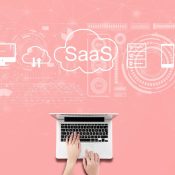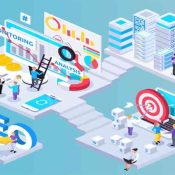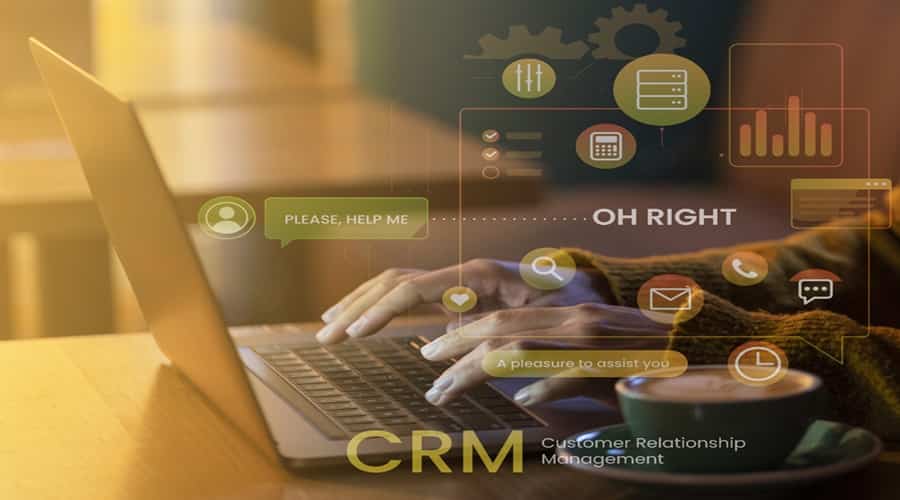
The Best SaaS CRM Software: Guide & Reviews
In today’s hyper-competitive business landscape, customer relationships are the lifeblood of success. Effective management of these relationships can mean the difference between stagnation and exponential growth. Enter SaaS CRM – a powerful combination of Software as a Service (SaaS) and (CRM) that promises to revolutionize how businesses acquire, retain, and delight their customers. By leveraging cloud-based technology and data-driven insights, SaaS CRM solutions empower organizations of all sizes to streamline customer-centric operations and unlock unprecedented growth opportunities.
What is Software as a Service (SaaS)?
Software as a Service (SaaS) is a modern approach to software application delivery. Instead of buying and installing the program on different PCs or servers, customers utilize this technique to access it online. Consider it like buying a service subscription rather than a tangible product.
SaaS entails the provider hosting and managing the application on the cloud. This frees users from the hassle of software maintenance by giving the provider full control over all technical facets like security, upgrades, and maintenance. Users can access the program from anywhere at any time with an internet connection; typically, they can use a customized app or web browser.
This cloud-based method has several benefits. First, customers can modify their subscriptions to suit their needs, adding or removing features or users as needed, making them more adaptable and scalable. Second, it’s frequently more affordable because consumers pay a monthly fee rather than a substantial upfront investment in hardware and software licenses. Thirdly, because the supplier automatically releases updates and enhancements, it’s often simpler to use and manage.
What is Customer Relationship Management (CRM)?
Businesses utilize consumer Relationship Management (CRM) as a collection of tactics, procedures, and tools to manage and comprehend consumer interactions throughout the customer journey. It is the center of an organization’s efforts to establish and preserve enduring client bonds.
CRM systems help businesses organize and analyze customer data, including contact information, purchase history, preferences, and interactions. These systems streamline important processes such as managing leads, automating sales tasks, orchestrating marketing efforts, providing customer support, and analyzing data to gain insights into customer behavior.
CRM solutions simplify and centralize this data, enabling businesses to gain a deeper understanding of the requirements and preferences of their clientele. Companies may increase consumer loyalty and promote quick growth by personalizing their interactions and products.
In essence, CRM is all about building and nurturing relationships with customers. The goal is to create mutually beneficial, long-lasting connections that lead to increased satisfaction, loyalty, and profitability.
What is SaaS CRM?
The two main elements of software-as-a-service customer relationship management are the SaaS distribution mechanism and CRM systems’ features.
In a SaaS CRM(Customer Relationship Management) configuration, the service provider hosts and maintains all client data associated with the CRM software on the cloud. This implies that consumers can access the CRM system from anywhere using any internet-connected device.
There are various benefits to this combo. Firstly, it’s incredibly adaptable and versatile, enabling companies to modify their CRM system to meet evolving requirements without worrying about keeping up with software or hardware updates. Second, it’s affordable since consumers usually pay a subscription fee instead of investing upfront in costly infrastructure or licenses. Thirdly, because the provider manages updates, it guarantees that the program is always up to date with the newest features and security patches. Lastly, it easily interfaces with other cloud-based products, improving efficiency and teamwork throughout the company.
Overall, This provides businesses with a powerful and convenient way to manage their customer relationships, leveraging the benefits of cloud computing to drive growth and success.
Who needs a SaaS CRM?
SaaS CRM solutions are valuable for businesses of all sizes and across various industries, including:
Small and Medium-sized Businesses (SMBs):
SaaS CRM provides SMBs with enterprise-grade CRM capabilities without the need for substantial upfront investments or dedicated IT resources.
Sales and Marketing Teams:
Sales teams can leverage SaaS CRM(Customer Relationship Management) for lead management, opportunity tracking, and sales forecasting, while marketing teams can utilize it for campaign management, lead nurturing, and customer segmentation.
Customer Service and Support:
SaaS CRM enables efficient customer service by providing a centralized view of customer interactions, streamlining case management, and facilitating seamless communication across channels.
E-commerce and Retail Businesses:
Online and physical shops can use SaaS CRM to collect insightful data on customer behavior, preferences, and purchase patterns. This data can then be used to personalize customer experiences and focus marketing efforts.
Startups and Entrepreneurial Ventures:
Startups and entrepreneurial ventures often need more resources. SaaS CRM offers a cost-effective solution to manage customer relationships from the outset. With its scalability, startups can easily expand their CRM capabilities as their business grows without the need for significant upfront investments.
Professional Services Firms:
Professional services firms, such as consulting, legal, and accounting, rely heavily on client relationships. SaaS CRM helps them track client interactions, manage projects, and deliver personalized services. By centralizing client data and communication, these firms can enhance client satisfaction and loyalty, ultimately leading to repeat business and referrals.
Nonprofit Organizations:
These groups depend on donations and involvement from the community to run their operations on a limited budget. By utilizing SaaS CRM, nonprofits may effectively track fundraising activities, maintain donor connections, and segment their supporter base for more focused outreach. Nonprofit organizations can increase their influence and accomplish their missions with improved donor management and engagement.
Manufacturing and Supply Chain Management:
Building strong relationships with suppliers and distributors is crucial in manufacturing and supply chain management. SaaS Customer Relationship Management helps manufacturers and distributors streamline supply chain processes, track orders, and manage inventory levels. By maintaining transparent communication and collaboration with their partners, businesses can ensure smoother operations and minimize disruptions.
Healthcare and Wellness Industries:
Healthcare providers, clinics, and wellness centers can benefit from SaaS Customer Relationship Management to enhance patient care and satisfaction. By capturing patient data, scheduling appointments, and sending reminders, healthcare professionals can improve efficiency and reduce no-show rates. Moreover, CRM analytics can help identify patient behavior and preferences trends, allowing for more personalized care and targeted health interventions.
Real Estate and Property Management:
Property management companies and real estate agencies work with many clients and assets. SaaS CRM helps them with transaction coordination, client preference tracking, and property listing management. By centralizing client communication and property data, real estate agents can expedite the buying and selling process and create happier, faster transactions.
SaaS CRM Benefits and Main Features:
SaaS CRM solutions offer a multitude of benefits and features, including:
Accessibility and Mobility:
SaaS CRM systems that are cloud-based can be accessed on any device with an internet connection and from any location. This allows team members to collaborate seamlessly and work remotely from any place or device of choice.
Scalability and Flexibility:
SaaS CRM solutions are highly scalable, allowing businesses to adjust their CRM capabilities as needed without the hassle of additional hardware or infrastructure investments. Whether scaling up to accommodate business growth or downsizing during lean times, SaaS CRM offers the flexibility to adapt to changing needs.
Automatic Updates and Upgrades:
SaaS providers constantly update and improve their software to ensure that users always have access to the newest features and security patches. As a result, businesses save time and effort by not needing manual updates or maintenance.
Reduced IT Overhead:
Businesses can do away with the requirement for specialized IT staff, on-premises gear, and software maintenance by choosing SaaS CRM. In addition to cutting expenses, this decrease in IT overhead also frees up important resources that could be used for other important strategic projects.
Robust Data Security:
SaaS CRM providers with a good reputation prioritize data security and take strict precautions to protect sensitive customer data. This involves stringent access controls, frequent backups, and data encryption to reduce the danger of data breaches and illegal access.
Integration Capabilities:
To create a connected technological environment, SaaS CRM solutions frequently offer seamless connectivity with other cloud-based tools and services. This connection allows businesses to increase productivity, optimize operations, and fully utilize their software stack.
Analytics and Reporting:
Generally, SaaS Customer Relationship Management solutions include reporting and analytics features. Users can measure important performance metrics, create comprehensive reports, and learn a great deal about their customers’ patterns and behavior. By utilizing this data-driven approach, businesses may make well-informed decisions and maximize the impact of their strategy.
Customization and Personalization:
SaaS CRM solutions frequently offer various customization choices, enabling companies to tailor the system to their unique requirements and work processes. Users can alter fields, layouts, and workflows to suit their tastes and working methods. Furthermore, businesses may send extremely relevant and targeted communications to their customers, increasing engagement and happiness thanks to extensive personalization tools.
Collaboration and Communication Tools:
Many SaaS CRM platforms include built-in collaboration and communication tools that facilitate teamwork and information sharing within the organization. Features like real-time messaging, task assignments, and shared calendars enable teams to collaborate more effectively, coordinate activities, and stay aligned on customer interactions and initiatives.
Customer Support and Training:
Reputable SaaS CRM providers assist businesses in getting the most out of their CRM investment by providing extensive customer support and training materials. Online guides, user forums, knowledge bases, and specialized help channels fall under this category. Furthermore, several suppliers offer support with onboarding and continuous training courses to guarantee that users have the abilities and information required to be successful with the CRM platform. By taking a proactive approach to customer service, companies may overcome obstacles, find quick solutions to problems, and maximize the use of CRM to achieve better outcomes.
SaaS CRM Types:
SaaS CRM solutions come in various types, each tailored to specific functionalities and target audiences. Here’s an overview of different types of SaaS CRM:
Operational CRM:
Operational CRM systems are designed to streamline and automate customer-facing processes, primarily in sales, marketing, and customer service departments. These systems manage customer interactions throughout their lifecycle, from lead generation and acquisition to post-sale support and service. By providing sales, marketing, and service automation tools, operational CRM helps organizations improve efficiency, increase productivity, and enhance customer satisfaction.
Analytical CRM:
Analytical CRM solutions offer advanced data analysis and reporting capabilities, allowing businesses to extract actionable insights from their customer data. These systems analyze customer behavior, preferences, and trends to help businesses understand their customers better and anticipate their needs. Analytical CRM enables data-driven decision-making, targeted marketing campaigns, and personalized customer experiences by leveraging predictive analytics, data visualization, and reporting tools.
Collaborative CRM:
Collaborative CRM systems focus on facilitating effective communication involved in customer interactions. These systems enable seamless sharing of customer data, communication history, and action plans across departments and functions, ensuring consistent and coordinated customer experiences. Collaborative CRM fosters teamwork, knowledge sharing, and cross-functional alignment, improving customer satisfaction and loyalty.
Strategic CRM:
Strategic CRM solutions align an organization’s customer-centric strategies and initiatives with its business objectives. These systems integrate customer data and insights into strategic planning processes, enabling businesses to identify high-value customers, prioritize opportunities, and allocate resources effectively. Strategic CRM fosters long-term customer relationships by implementing targeted strategies, measuring performance against key metrics, and adapting to changing market dynamics.
Social CRM:
Social CRM integrates social media data and interactions into the CRM process, effectively allowing businesses to engage with customers and prospects on social platforms. These systems monitor social media channels for mentions, comments, and feedback, enabling businesses to respond promptly, gather insights, and leverage social data for targeted marketing and customer service initiatives. Social CRM helps businesses build brand awareness, nurture relationships, and drive engagement through social media channels.
What makes SaaS CRM different from CRM?
Delivery Model:
CRM:
Traditional CRM software is typically installed and run on-premises, requiring businesses to purchase licenses and manage the software and infrastructure internally.
SaaS CRM:
This CRM uses a cloud-based distribution approach. The provider hosts and manages the CRM software. Users pay a monthly fee to access the system over the Internet.
Accessibility:
CRM:
On-premises CRM systems are accessible only from the devices and network within the organization’s premises, limiting remote access.
SaaS CRM:
SaaS CRM solutions offer accessibility from any internet-connected device, allowing users to access the system remotely fostering flexibility and mobility.
Cost Structure:
CRM:
Traditional CRM software often involves significant upfront costs for purchasing licenses and ongoing maintenance, upgrades, and IT infrastructure expenses.
SaaS CRM:
This is available on a subscription basis, with users paying a monthly or annual fee for access. This strategy is more predictable and economical for organizations because it usually covers all infrastructure, maintenance, and upgrade costs.
Scalability:
CRM:
Scaling traditional CRM systems often requires additional hardware, software licenses, and IT resources, making it complex and time-consuming.
SaaS CRM:
SaaS CRM solutions are highly scalable, allowing businesses to easily adjust their subscription plans or add/remove features as needed without significant infrastructure changes.
Maintenance and Updates:
CRM:
Businesses using on-premises CRM systems must perform time- and resource-consuming internal maintenance procedures such as software updates, patches, and backups.
SaaS CRM:
This providers automatically handle all maintenance duties, such as backups and parades. This guarantees that companies always have access to the newest features and security improvements while relieving them of IT overhead.
Integration:
CRM:
Integrating traditional CRM software with other business systems and applications may require custom development or middleware solutions, leading to added complexity and costs.
SaaS CRM:
SaaS CRM solutions often offer seamless integration with other cloud-based tools and applications through APIs (Application Programming Interfaces), facilitating a connected ecosystem and streamlined workflows.
Data Security:
CRM:
Data security in on-premises CRM systems relies on the organization’s internal IT infrastructure and security protocols, which may vary in effectiveness.
SaaS CRM:
SaaS CRM providers implement robust security measures, including data encryption, regular audits, and strict access controls, to safeguard customer data stored in the cloud, offering enhanced security and compliance assurances.
What are the best SaaS CRM solutions?
The market for SaaS CRM is very competitive, with several suppliers providing various options. The following are a few of the most well-liked and acclaimed SaaS CRM programs:
Top 10 SaaS CRM Software:
Salesforce:
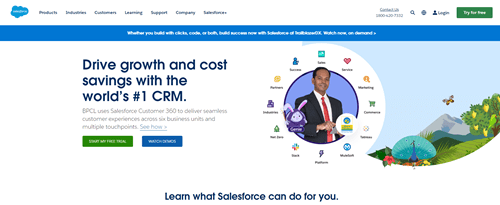
Best for:
Enterprise-level CRM, sales automation, and marketing automation.
Description:
Salesforce is a leading SaaS CRM platform that offers a comprehensive suite of solutions for sales, marketing, customer service, and analytics.
Pricing:
Starts from $25/user/month for the Essentials edition.
HubSpot:

Best for:
Inbound marketing, sales automation, and customer service.
Description:
HubSpot provides an all-in-one SaaS CRM platform with tools for marketing, sales, customer service, and operations management.
Pricing:
Free plan available; paid plans start from $45/month.
Zoho CRM:
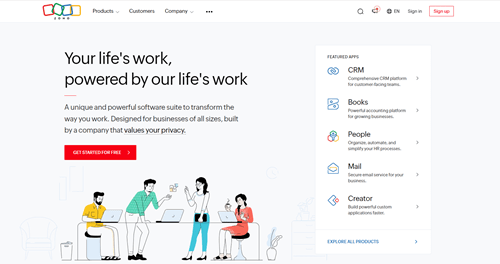
Best for:
Small and medium-sized businesses, sales automation, and customer support.
Description:
Zoho CRM is a comprehensive SaaS CRM solution with sales, marketing, customer service, and analytics features.
Pricing:
Free plan available; paid plans start from $14/user/month.
Freshworks CRM (formerly Freshsales):
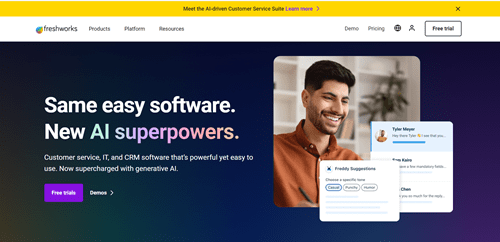
Best for:
Sales automation, lead management, and customer support.
Description:
Freshworks CRM offers a user-friendly SaaS platform with robust sales and customer service capabilities.
Pricing:
Starts from $15/user/month.
Pipedrive:

Best for:
Sales pipeline management and lead tracking.
Description:
With Pipedrive, sales teams can manage their pipelines and close more prospects thanks to a simple, visual SaaS CRM solution.
Pricing:
Starts from $12.50/user/month.
Insightly:
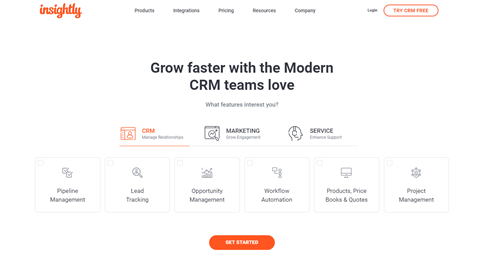
Best for:
Small and medium-sized businesses, project management, and sales automation.
Description:
Insightly combines CRM, project management, and sales automation capabilities in a single SaaS platform.
Pricing:
Starts from $29/user/month.
Keap (formerly Infusionsoft):
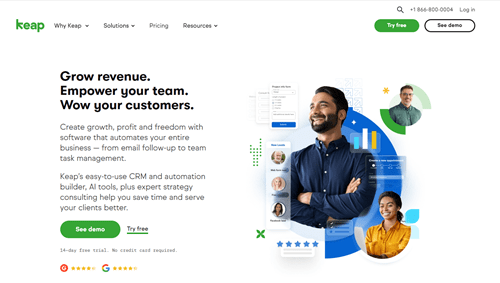
Best for:
Small businesses, marketing automation, and sales automation.
Description:
Keap is an all-in-one SaaS CRM and marketing automation platform for small businesses.
Pricing:
Starts from $79/month.
Monday.com CRM:
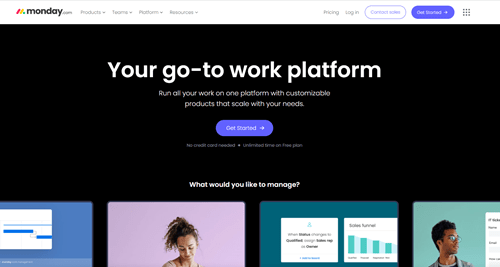
Best for:
Customer relationship management, sales tracking, and project management.
Description:
Monday.com offers a versatile SaaS CRM platform integrating project management with sales and customer relationship management tools.
Pricing:
Starts from $8/user/month.
Microsoft Dynamics 365 CRM:
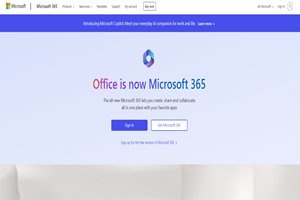
Best for:
Large enterprises, sales automation, and customer service.
Description:
Microsoft Dynamics 365 CRM offers a comprehensive SaaS CRM solution with powerful sales automation and customer service features seamlessly integrated with Microsoft’s suite of business tools.
Pricing:
Starts from $65/user/month.
Copper (formerly ProsperWorks):

Best for:
Small businesses, G Suite users, and sales automation.
Description:
Copper is a SaaS CRM platform built specifically for G Suite users, offering seamless integration with Gmail and other Google apps, with features tailored for sales automation and lead management.
Pricing:
Starts from $19/user/month.
Agile CRM:
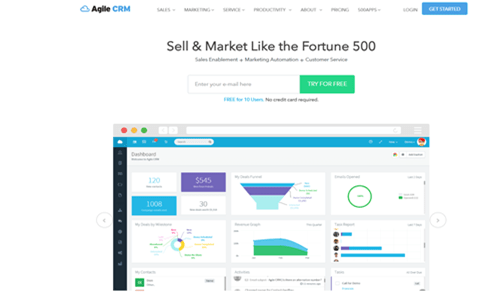
Best for:
Small and medium-sized businesses, marketing automation, and customer support.
Description:
Agile CRM is an all-in-one SaaS platform with marketing automation, sales automation, and customer support features. It is designed to streamline business processes for small and medium-sized businesses.
Pricing:
Free plan available; paid plans start from $8.99/user/month.
FAQs
What distinguishes SaaS CRM(Customer Relationship Management) from conventional CRM?
Software as a Service (SaaS) CRM, or Customer Relationship Management, is a cloud-based delivery model in which a provider hosts and manages CRM software. In contrast to traditional CRM, which necessitates installation and upkeep on-premises, SaaS CRM provides automatic updates, scalability, and accessibility without requiring extra equipment.
What are the main advantages of SaaS CRM(Customer Relationship Management) for companies?
SaaS CRM offers several advantages, such as seamless connection with other cloud-based tools and apps, scalability to support business expansion, automatic updates and upgrades, decreased IT overhead, and accessibility from any internet-connected device.
How can SaaS CRM(Customer Relationship Management) help businesses improve customer relationships?
SaaS CRM enables businesses to centralize customer data, automate processes, gain insights through analytics, collaborate effectively, and align strategies with customer needs. By leveraging these capabilities, businesses can deliver personalized experiences, increase customer satisfaction, and drive loyalty and retention.
What factors should businesses consider when selecting a SaaS CRM solution?
When choosing a SaaS CRM solution, businesses should evaluate scalability, customization options, integration capabilities, user experience, pricing structure, customer support, data security measures, and compliance with industry regulations.
What are some common challenges businesses may face when implementing Software as a Service CRM?
Challenges with SaaS Customer Relationship Management implementation may include data migration issues, user adoption resistance, customization complexities, integration hurdles, ongoing training needs, and ensuring data privacy and compliance. However, with proper planning, communication, and support, these challenges can be overcome effectively.
How can businesses ensure the successful adoption and utilization of Software as a Service CRM within their organization?
To ensure the successful adoption of SaaS CRM, businesses should provide comprehensive user training, promote a culture of collaboration and transparency, regularly communicate the CRM system’s benefits, solicit user feedback, continuously monitor and optimize processes, and leverage vendor support and resources.
Conclusion
In conclusion, SaaS CRM offers businesses a modern and efficient way to manage customer relationships in today’s digital age. By leveraging cloud-based technology, businesses can access powerful CRM capabilities without the complexity and cost associated with traditional CRM systems. With its accessibility, scalability, security, and integration capabilities, SaaS CRM empowers businesses to streamline processes, gain insights, and deliver exceptional customer experiences. By selecting the right SaaS CRM solution and implementing it effectively, businesses can drive growth, improve productivity, and build long-lasting, profitable customer relationships.


